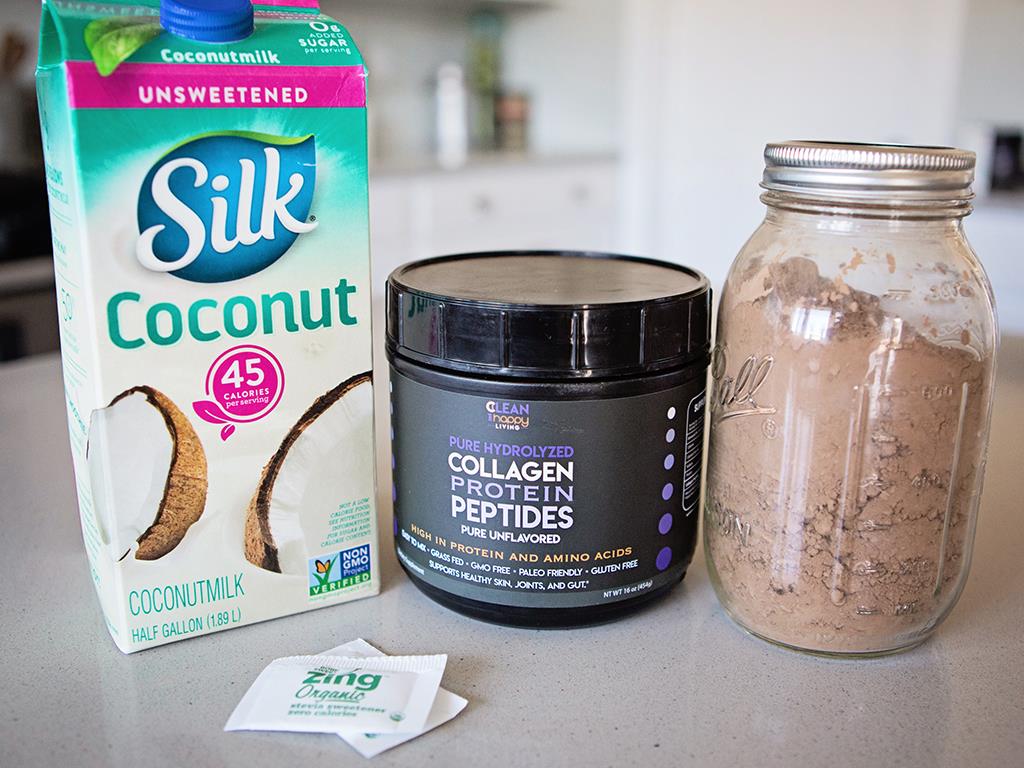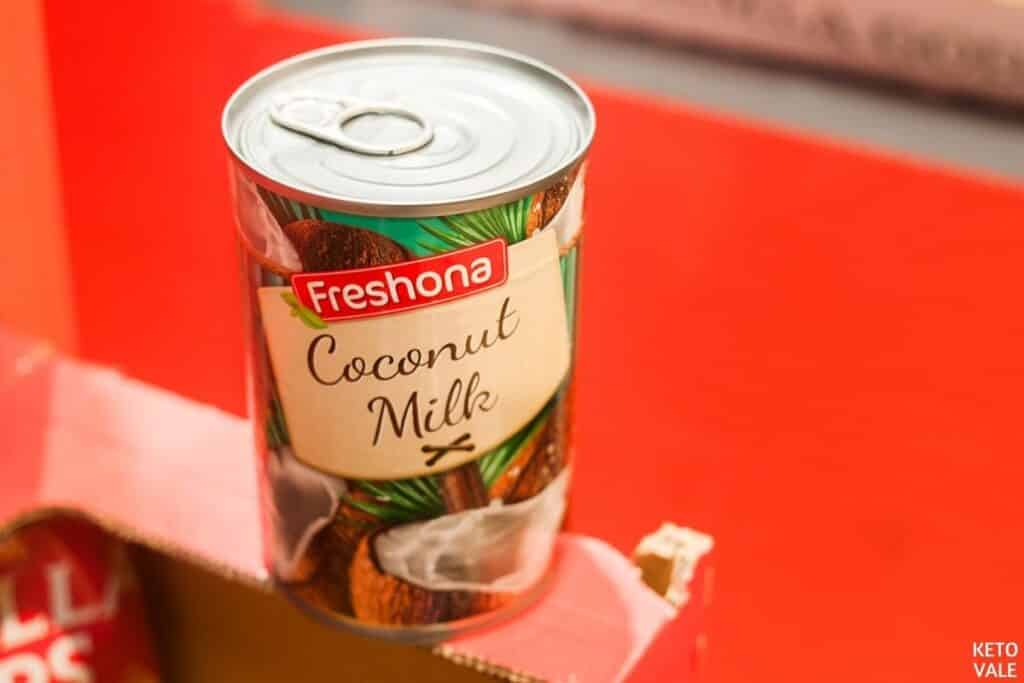Coconut milk is an excellent plant-based alternative to cow’s milk. It’s full of healthy fats and contains no lactose or hard-to-digest sugars, making it ideal for sensitive stomachs.
However, the nutritional value of coconut milk varies by product, brand, and how you make it. Many contain added sugars and buying the wrong one can kick you out of ketosis.
In this article, we’ll discuss whether you can have coconut milk on the keto diet. We’ll also provide tips for picking out the best brand to suit your low-carb needs.
Coconut Milk Nutrition Facts Table
A 100-gram serving of raw coconut milk (the liquid extracted from grated coconut meat and water) contains the following (*):
- 230 calories
- 23.8 grams of fat
- 5.54 grams of carbs (3.34 grams net carbs)
- 2.2 grams of fiber
- 2.29 grams of protein
Keep in mind that the nutritional value of coconut milk varies by brand and how the product was made.
For example, you may notice that many store-bought brands made with fresh, unsweetened, pourable coconut milk contain around 40 calories and 1 gram of carbs per cup, while some unsweetened canned milks are thicker, not as easy to pour, and much higher in calories and fat.
Always check the nutritional label on your coconut milk to determine its macronutrient profile.
How Many Carbs In Coconut Milk?
As noted above, the carbs in coconut milk vary depending on what brand you buy. Many store-bought brands of fresh, refrigerated coconut milk are made with filtered milk, which is much lower in calories, fat, and carbs than homemade versions.
Canned coconut milk usually contains full-fat milk – or milk that is not filtered. This is why it contains more calories, fat, and carbs.
Store-bought milks also tend to be fortified with vitamins and minerals, and they may contain added sweeteners, flavors, additives, or flavors. Therefore, it’s important that you always buy the unsweetened kind to avoid unwanted carbs – whether it’s fresh or canned.
With all of that being said, a 100-gram serving of homemade coconut milk made from the liquid extracted from grated coconut meat and water contains around 3.34 grams of net carbs.

Is Coconut Milk Healthy?
Yes, this type of milk is very healthy! First, it’s much easier to digest than regular cow’s milk because it does not contain lactose or any inflammatory compounds that may induce intestinal dysfunction.
It’s also a good source of healthy medium-chain fatty acids, otherwise known as MCTs, including lauric, capric, and caprylic acids.
MCTs are processed in the liver and they’re smaller in size than long-chain fatty acids, allowing them to enter cells easily where they are used as energy and NOT stored as fat.
Additionally, MCTs have antimicrobial, antibacterial, anti-fungal, and immune-activating properties (*). Research shows that lauric acid is especially beneficial for fighting viruses and restoring balance to the gut microbiome, which is where most of your immune cells live (*).
Eating healthy fats from medium chain fatty acids can also help control your weight. According to one study, replacing long-chain fatty acids with MCTs could help induce modest reductions in body composition and body weight without negatively affecting lipid profiles (*).
Worried about the saturated fat content found in coconut products? Don’t be! Research has also disproven the myth that saturated fat is bad for your heart or cholesterol levels (*)(*).
The healthy fats found in coconut can also help preserve brain function and support memory, regulate blood sugar levels, reduce inflammation, control Candida overgrowth, and speed up the breakdown of fat reserves that may be piling up (*)(*)(*).
Is Coconut Milk Keto-Friendly?
Yes, coconut milk is a keto-friendly milk as long as you buy the unsweetened kind or make your own at home using keto-approved sweeteners, such as stevia, monk fruit extract, or erythritol.
Remember that the amount of carbs in coconut milk varies depending on what brand you buy.
You can control your carb intake by making your own coconut milk at home, but many people find that opening up a fresh coconut is a difficult task and it’s much easier to buy store-bought.
If you go the store-bought route, then make sure your milk is plain, unsweetened, and free from carrageenan – an additive in many organic food items that has been linked to intestinal inflammation (*).
If you’re on a strict keto diet, be sure that the brand you buy fits your macro needs. If you are simply on a low carb diet and you are not overly concerned about staying in ketosis, then just about any form of unsweetened coconut milk will be suitable for your dietary needs.
You can either buy fresh milk (the refrigerated kind) or canned milk (shelf stable). Fresh coconut milk is better for pouring, so use this for things like keto cereal, smoothies, or as an additive to your coffee.
Fresh milk also tends to be fortified with vitamins and minerals, which is a nice way to get more micronutrients into your diet.
Canned milk does not tend to be filtered, so you may find a layer of cream or fat on top that is delicious when used in baked goods or even eaten as is.
Look for an organic brand of canned milk that is not heavily saturated with additives, preservatives, and chemicals to keep it shelf-stable.
Check these keto recipes with coconut milk you can try:
- Keto Turmeric Latte with Coconut Milk
- Vietnamese Coconut Milk Iced Coffee
- Keto Chicken Curry With Coconut Milk
- Keto Beef Curry with Coconut Milk
Final Thoughts
Unsweetened coconut milk contains about 3 grams of net carbs per 100-gram serving, making it a keto-friendly alternative to cow’s milk that you can enjoy on a low carb diet.
However, the macronutrient profile may vary depending on what brand you buy – so be sure to check that your milk fits your carb allowance for the day if you’re trying to stay in ketosis.
It’s always best to make your own nut milk at home if you can. This allows you to use fresh, organic coconuts and keto-approved sweeteners.
If you buy store-bought, make sure it’s unsweetened and free from carrageenan.
Up next:







